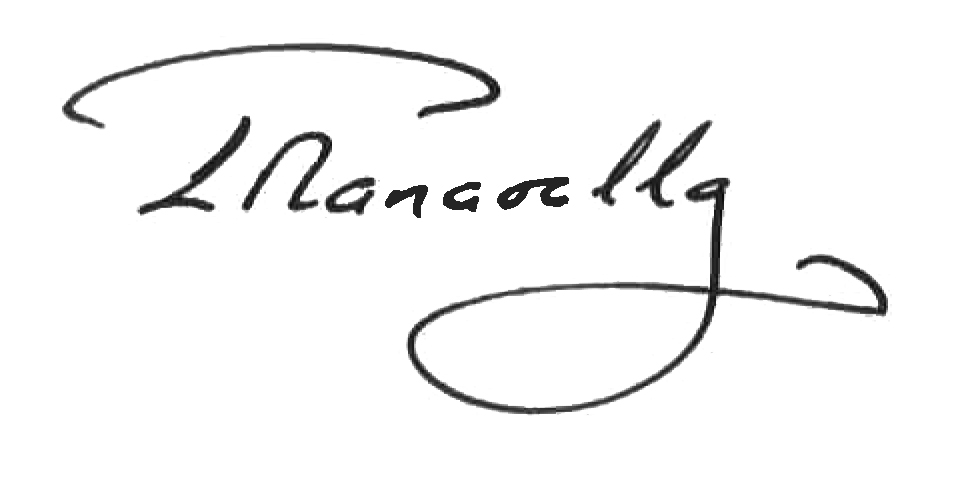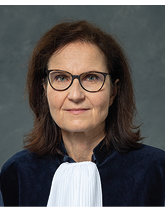A | The Court of Justice in 2022
The Court of Justice deals mainly with:
-
requests for a preliminary ruling
When a national court is uncertain as to the interpretation or validity of an EU rule, it stays the proceedings before it and refers the matter to the Court of Justice. When the matter has been clarified by the Court of Justice’s decision, the national court is then in a position to settle the dispute before it. In cases calling for a response within a very short time (for example, in relation to asylum, border control, child abduction, and so forth), an urgent preliminary ruling procedure (‘PPU’) may be used; -
direct actions, which seek:
- o the annulment of an EU act (‘action for annulment’), or
- o a declaration that a Member State is failing to comply with EU law (‘action for failure to fulfil obligations’). If the Member State does not comply with the judgment finding that it has failed to fulfil its obligations, a second action, known as an action for ‘twofold failure to fulfil obligations’, may result in the Court of Justice imposing a financial penalty on it;
- appeals, against decisions made by the General Court, on conclusion of which the Court of Justice may set aside the decision of the General Court;
- requests for an opinion on the compatibility with the Treaties of an agreement which the European Union envisages concluding with a non-member State or an international organisation (submitted by a Member State or by a European institution).
Activities and developments at the Court of Justice
The composition of the Court of Justice did not change in 2022 and nor did the texts governing its activities, the Statute of the Court of Justice of the European Union and the Rules of Procedure.
After two years impacted by the health crisis, 2022 saw the widespread return of staff to the Institution’s premises and a re-establishment of normal working conditions, in particular as regards the holding of hearings. The technological developments necessitated by the health measures of the past two years were, however, put to use to implement certain major projects intended to bring justice in Europe closer to its citizens.
For example, since 26 April 2022, the Court of Justice has offered a streaming service for hearings which, like the remote visit project launched in 2021, aims to bolster its image as a ‘Citizens’ Court’ which is more accessible to the general public. The broadcasts are designed to allow anyone wishing to follow hearings to do so as if they were physically present in Luxembourg, in the courtroom, thanks to simultaneous interpretation of the discussions into the languages necessary for the smooth conduct of the hearing.
Statistically speaking, 2022 will once again have been a year of sustained activity. 806 cases were brought before the Court of Justice. As in previous years, those cases were, in the main, requests for preliminary rulings and appeals which, at 546 and 209 cases respectively, alone represent over 93% of the total cases brought in 2022. Those cases cover fields as varied and sensitive as the preservation of the fundamental values of the European Union and the protection of personal data, consumers or the environment, not forgetting the areas of taxation, competition and State aid. There were, in addition, a number of cases related to the health crisis or the war in Ukraine.
808 cases were closed by the various formations of the Court of Justice. A significant number (78) were heard by the Grand Chamber and two of them, concerning the link between respect for the rule of law and the implementation of the EU budget, were decided by the full Court (Cases C‑156/21, Hungary v Parliament and Council, and C‑157/21, Poland v Parliament and Council).
In view of the frequent use made of orders, particularly in relation to appeals, the overall duration of proceedings (16.4 months) remained similar to that of the previous year (16.6 months). However, as a sign of the greater complexity of the questions being submitted to the Court of Justice, there was an increase in the average time taken to deal with requests for preliminary rulings (17.3 months, compared with 16.7 months in 2021).
As of 31 December 2022, the number of cases pending before the Court of Justice stood at 1 111, just two fewer than the number as of 31 December 2021 (1 113 cases).
In the light of those statistics, and in view of the fact that, since July 2022, the General Court has had 54 Judges (two per Member State) following the completion of the reform to the judicial architecture of the European Union decided upon in 2015, the Court of Justice submitted to the EU legislature a request to amend the Statute in two respects. Its purpose is to enable the Court of Justice to continue to be able to deliver high-quality judgments in a timely manner, but also to focus to a greater extent on its core roles as the supreme and constitutional court of the European Union.
In the first place, the request for amendment involves transferring to the General Court jurisdiction to give preliminary rulings in five clearly defined areas, which rarely raise issues of principle, are built upon a solid body of case-law of the Court of Justice and represent, in addition, a sufficiently high number of cases for the proposed transfer to have a real impact on the Court of Justice’s workload: the common system of VAT, excise duties, the Customs Code and the tariff classification of goods under the Combined Nomenclature, compensation and assistance to passengers and the scheme for greenhouse gas emission allowance trading.
The General Court’s jurisdiction to give preliminary rulings in a case would be without prejudice to the option which that court has of referring the case to the Court of Justice if it considers that that case requires a decision of principle likely to affect the unity or consistency of EU law. The Court of Justice would also have the possibility, exceptionally, of reviewing the decision of the General Court where there is a serious risk of that unity or consistency being affected.
In the second place, against the background of a significant number of appeals against decisions of the General Court, in order to maintain the efficiency of such proceedings and to allow the Court of Justice to focus on the appeals that raise important legal questions, the legislative request advocates an extension of the mechanism for the determination of whether an appeal is allowed to proceed, which entered into force on 1 May 2019 (Article 58a of the Statute).
That extension would concern appeals brought against decisions of the General Court concerning decisions of the independent boards of appeal of certain offices and agencies of the Union which had not initially been mentioned in Article 58a of the Statute when it entered into force on 1 May 2019 (for example, the European Union Agency for Railways, the European Agency for the Cooperation of Energy Regulators, the European Banking Authority, the Securities and Markets Authority and the Insurance and Occupational Pensions Authority).
Koen Lenaerts
President of the Court of Justice of the European Union


806 cases brought
546 preliminary ruling proceedings including 5 PPUs
Member States from which the most requests originate:
Germany 98
Italy 63
Bulgaria 43
Spain 41
Poland 39
37 direct actions, including: 35 actions for failure to fulfil obligations and 2 actions for ‘twofold failure to fulfil obligations’
209 appeals brought against decisions of the General Court
6 applications for legal aid
A party who is unable to meet the costs of the proceedings may apply for legal aid.

808 cases resolved
546 preliminary ruling procedures including 7 PPUs
36 direct actions including 17 failures to fulfil obligations found against 12 Member States
196 appeals against decisions of the General Court including 38 in which the decision adopted by the General Court was set aside
1 opinion
Average duration of proceedings: 16.4 months
Average duration of urgent preliminary ruling proceedings: 4.5 months

1 111 cases pending as of 31 December 2022
Principal matters dealt with:
State aid 58
Competition 64
Law governing the institutions 38
Environment 46
Area of Freedom, Security and Justice 132
Taxation 80
Social policy 73
Intellectual property 33
Consumer protection 77
Approximation of laws 89
Members of the Court of Justice
The Court of Justice is composed of 27 Judges and 11 Advocates General.
The Judges and Advocates General are appointed by common accord of the governments of the Member States after consultation of a panel responsible for giving an opinion on prospective candidates’ suitability to perform the duties concerned. They are appointed for a term of office of six years, which is renewable.
They are chosen from among individuals whose independence is beyond doubt and who possess the qualifications required for appointment, in their respective countries, to the highest judicial offices, or who are of recognised competence.
The Judges perform their duties in a totally impartial and independent manner.
The Judges of the Court of Justice appoint, from amongst themselves, the President and Vice-President. The Judges and Advocates General appoint the Registrar for a term of office of six years.
The Advocates General are responsible for presenting, with complete impartiality and independence, an ‘opinion’ in the cases assigned to them. This opinion is not binding, but allows for an additional view to be provided on the subject matter of the dispute.
In 2022, no new Members were appointed to the Court of Justice.

K. Lenaerts

L. Bay Larsen

A. Arabadjiev

A. Prechal

K. Jürimäe

C. Lycourgos

E. Regan

M. Szpunar

M. Safjan

P. G. Xuereb

L. S. Rossi

D. Gratsias

M. L. Arastey Sahún

J. Kokott

M. Ilešič

J.-C. Bonichot

T. von Danwitz

S. Rodin

F. Biltgen

M. Campos Sánchez-Bordona

N. J. Cardoso da Silva Piçarra

G. Pitruzzella

I. Jarukaitis

P. Pikamäe

A. Kumin

N. Jääskinen

N. Wahl

J. Richard de la Tour

A. Rantos

I. Ziemele

J. Passer

A. M. Collins

M. Gavalec

N. Emiliou

Z. Csehi

O. Spineanu-Matei

T. Ćapeta

L. Medina

A. Calot Escobar
Order of Precedence as from 7 October 2022
B | The General Court in 2022
Proceedings may primarily be brought before the General Court, at first instance, in direct actions brought by natural or legal persons, where they are directly and individually concerned (individuals, companies, associations, and so forth), and by Member States against acts of the institutions, bodies, offices or agencies of the European Union, and in direct actions seeking compensation for damage caused by the institutions or their staff.
A large part of the litigation before it is economic in nature: intellectual property (EU trade marks and designs), competition, State aid, and banking and financial supervision.
The General Court also has jurisdiction to adjudicate in civil service disputes between the European Union and its staff.
The decisions of the General Court may be the subject of an appeal, limited to points of law, before the Court of Justice. In cases which have already been considered twice (by an independent board of appeal and then by the General Court), the Court of Justice will allow an appeal to proceed only if it raises an issue that is significant with respect to the unity, consistency or development of EU law.
Activities and developments at the General Court
The year 2022 saw the return of war to our continent. This tragic occurrence must be a moment of collective realisation for all Europeans. Peace is never permanent and requires the commitment of all. Our institution lies at the heart of that commitment. It is the role of the Court of Justice and the General Court to ensure respect for the rule of law and to work to protect human dignity. Within the European Union, conflicts are not settled by threats and weapons, but by debate and the law. In that context, the General Court is called upon, sometimes within a very short timeframe, to review the legality of the restrictive measures adopted by the European Union in respect of persons or entities linked to the aggression waged by the Russian Federation since February 2022. For example, the judgment in the case of RT France v Council was given by the Grand Chamber of the General Court, under an expedited procedure, five months after the case was brought. To date, more than 70 cases of restrictive measures associated with the armed conflict have been brought. It is to our Union’s credit that such measures do not bear hallmarks of arbitrary decision-making and are therefore subject to a review by independent and impartial judges.
More than ever, the cases brought before the General Court reflected the major social issues facing our continent. In addition to restrictive measures, which do not just concern the war in Ukraine, such issues include the regulation of digital giants in matters of competition and the rules governing State aid, in particular in the field of taxation and in the energy and environmental sectors, as well as banking and financial law, the protection of personal data, the common commercial policy and the regulation of energy markets. In view of the recent legislative developments and the international context, which continues to be shaped by greater pressures, we could see greater scrutiny of the legality of the acts of the EU institutions.
Make no mistake: the General Court is fully aware of its responsibilities. It has the resources to meet them. Over the past year, the court has welcomed eight new Members, thus marking the completion of the reform process initiated by Regulation 2015/2422. Now with 54 Members, the General Court is finally composed of two Judges per Member State. Looking to the new three-year period which began in September 2022, the General Court has also been devoting greater consideration to its organisation and its working methods, with emphasis being placed on a more in-depth judicial review process, support for the parties to a dispute throughout the proceedings and the duration of proceedings (16.2 months on average in 2022). A thereby strengthened and reorganised General Court has set its future course: to deliver high-quality justice that individuals can understand within time limits consistent with the needs of today’s world.
The judicial architecture of the European Union must constantly adapt to the challenges of our time. It is with that in mind that in November 2022 the Court of Justice submitted a legislative request seeking, inter alia, to define specific areas in which the General Court could have jurisdiction to hear and determine questions referred for a preliminary ruling by the courts and tribunals of the Member States (Article 256 TFEU). The General Court stands ready to support the Court of Justice, which is having to deal with an increasing workload. Having been closely involved in the considerations which led to the development of that initiative, the General Court is now preparing for its implementation.
Marc van der Woude
President of the General Court


904 cases brought

858 cases resolved
760 direct actions, including:

1 474 pending cases (as of 31 December 2022)
Principal matters:
Innovations in case-law
At the General Court, as elsewhere, life does not stand still. While disputes arising from the COVID-19 pandemic are still taking it along uncharted pathways, as shown by the judgment in Roos and Others v Parliament of 27 April 2022 (T‑710/21, T‑722/21 and T‑723/21) in which the General Court examined for the first time the legality of certain restrictions imposed by the institutions of the European Union in order to protect the health of their staff, the military aggression launched by the Russian Federation against Ukraine on 24 February 2022 has created a new source of litigation. For instance, in its judgment in RT France v Council of 27 July 2022 (T‑125/22), the General Court, sitting as the Grand Chamber, gave an unprecedented ruling, at the end of an expedited procedure, on the legality of restrictive measures adopted by the Council seeking to prohibit the broadcasting of audiovisual content.
However, as multi-faceted as that turn of events may be, the General Court has continued to make many advances in its case-law in more traditional fields.
Thus, on institutional matters, in the judgment in Verelst v Council of 12 January 2022 (T‑647/20), the General Court considered for the first time the legality of Implementing Decision 2020/1117 appointing the European Prosecutors of the European Public Prosecutor’s Office, adopted pursuant to Regulation 2017/1939 implementing enhanced cooperation on the establishment of that office. On completion of its examination, it came to the conclusion that the Council had wide discretion when assessing and comparing the merits of the candidates for the position of European Public Prosecutor of a Member State, adding that, in the case in question, the successful candidate had been selected and appointed within the limits of that wide power of discretion. In the field of public procurement, the General Court, in the judgment in Leonardo v Frontex of 26 January 2022 (T‑849/19), examined the admissibility of an action for annulment directed against a contract notice and the annexes thereto brought by an undertaking which had not participated in the tendering procedure organised by that notice. Ruling in extended composition, it held that an undertaking which demonstrated that its participation in a tendering procedure had been made impossible by the requirements of the tender specifications could establish an interest in bringing proceedings against a number of documents of a contract. Finally, in the area of competition, in the judgment in Illumina v Commission of 13 July 2022 (T‑227/21), the General Court gave its first ruling on the application of the referral mechanism provided for in Article 22 of Regulation No 139/2004 to a transaction that did not have to be notified in the State which made the referral request but which entailed the acquisition of an undertaking whose significance for competition was not reflected in its turnover. In that case, the General Court acknowledged, in principle, that the Commission may be regarded as competent in such a situation.
Savvas S. Papasavvas
Vice-President of the General Court

Members of the General Court
The General Court is composed of two Judges from each Member State.
The Judges are chosen from among individuals whose independence is beyond doubt and who possess the qualifications required for appointment to the highest judicial offices. They are appointed by common accord of the governments of the Member States after consultation of a panel responsible for giving an opinion on candidates’ suitability. They are appointed for a term of office of six years, which is renewable. They appoint, from amongst themselves, the President and Vice-President for a period of three years, and appoint the Registrar for a term of office of six years.
The Judges perform their duties in a totally impartial and independent manner.

M. van der Woude

S. Papasavvas

D. Spielmann

A. Marcoulli

F. Schalin

R. da Silva Passos

J. Svenningsen

M. J. Costeira

K. Kowalik-Bańczyk

A. Kornezov

L. Truchot

O. Porchia

M. Jaeger

S. Frimodt Nielsen

H. Kanninen

J. Schwarcz

M. Kancheva

E. Buttigieg

V. Tomljenović

S. Gervasoni

L. Madise

V. Valančius

N. Półtorak

I. Reine

P. Nihoul

U. Öberg

C. Mac Eochaidh

G. De Baere

R. Frendo

T. R. Pynnä

J. C. Laitenberger

R. Mastroianni

J. Martín y Pérez de Nanclares

G. Hesse

M. Sampol Pucurull

M. Stancu

P. Škvařilová-Pelzl

I. Nõmm

G. Steinfatt

R. Norkus

T. Perišin

D. Petrlík

M. Brkan

P. Zilgalvis

K. Kecsmár

I. Gâlea

I. Dimitrakopoulos

D. Kukovec

S. Kingston

T. Tóth

B. Ricziová

E. Tichy- Fisslberger

W. Valasidis

S. Verschuur

E. Coulon
Order of Precedence as from 19 September 2022
C | Case-law in 2022
- Focus The Regulation that makes payments from European funds conditional on respect for the rule of law is valid
- Focus The right of environmental associations to bring legal proceedings
- Focus The right to be forgotten versus the right of information
- Focus War in Ukraine: broadcasting ban imposed on pro-Russia media outlets and freedom of expression
- Focus Record fine of EUR 4.125 billion imposed on Google for restrictions imposed on manufacturers of Android mobile devices
- A look back at the most important judgments of the year
Focus
The Regulation that makes payments from European funds conditional on respect for the rule of law is valid

The rule of law
The rule of law is one of the fundamental values of the European Union which includes:
- the principle of legality, implying a transparent, accountable, democratic and pluralistic law-making process;
- the principle of legal certainty;
- the prohibition of arbitrariness of the executive powers;
- the principle of effective judicial protection (access to justice that is independent and impartial);
- the principle of the separation of powers;
- the principle of non-discrimination and equality before the law.
In order to protect the Union budget and the financial interests of the Union against effects resulting from breaches of the rule of law, a fundamental value upon which the EU is founded, the European Union has a new regime of conditionality.
That regime, introduced by Regulation 2020/2092 of the European Parliament and of the Council, makes the receipt of financing from the Union budget subject to the respect by the Member States for the principles of the rule of law. That regulation allows the Council, on completion of an investigation by the Commission, to adopt measures – such as the suspension of payments or financial corrections – in order to protect the Union budget and the financial interests of the Union where such breaches risk affecting them.
The Regulation was challenged by Hungary and Poland before the Court of Justice. In view of their exceptional importance, the cases were decided by the Court of Justice sitting as a full Court.
On 16 February 2022, the Court of Justice dismissed the actions brought by Hungary and Poland.
The Court of Justice points out that the European Union is founded on values common to the Member States, including the rule of law. Those common values define the very identity of the European Union as a common legal order and were accepted by all Member States on their accession to the European Union. Respect for the principles of the rule of law thus constitutes an obligation as to the result to be achieved imposed on Member States which flows directly from their membership of the European Union. It is a condition for the enjoyment by those States of all the other rights deriving from the application of the Treaties.
The financial interests of the Union may be seriously compromised by breaches of the principles of the rule of law committed in a Member State. Sound financial management can be ensured by Member States only if public authorities act in accordance with the law, if breaches of the law are effectively pursued, and if arbitrary or unlawful decisions of public authorities can be subject to effective judicial review by independent and impartial courts. The European Union must therefore be able to defend its financial interests, inter alia by measures to protect the Union budget. Accordingly, the Court of Justice finds that the regime introduced by the contested regulation does indeed fall within the concept of financial rules which determine in particular the procedure to be adopted for implementing the Union budget (Article 322 of the Treaty on the Functioning of the European Union (TFEU)). The Regulation was therefore correctly adopted on that legal basis.
The Court of Justice also explains, in response to certain arguments raised by Hungary and Poland, that the conditionality mechanism does not circumvent the procedure laid down in Article 7 of the Treaty on European Union (TEU). The two procedures pursue different aims and each has a distinct subject matter. In particular, Article 7 TEU allows a response to be given to all serious and persistent breaches of one of the founding values of the European Union, or to any clear risk of such a breach, whereas the contested regulation applies only to breaches of the principles of the rule of law and only where there are reasonable grounds to consider that those breaches have budgetary implications.
The Court of Justice also rejects the argument that the principles of the rule of law lack any specific substantive content in European Union law. Those principles have been developed extensively in its case-law and are thus specified in the legal order of the European Union. They have their source in the common values which are recognised and applied by the Member States in their own legal systems. Accordingly, the Member States are in a position to determine with sufficient precision the essential content and the requirements flowing from each of those principles.
Finally, the implementation of the conditionality mechanism requires that a genuine link be established between a breach of a principle of the rule of law and an effect or serious risk of an effect on the sound financial management of the European Union. The implementation of that mechanism also requires the Commission to observe strict procedural requirements. Hungary and Poland are therefore not justified in claiming that the powers granted to the Commission and the Council are too extensive. The Court of Justice concludes therefrom that the contested regulation meets the requirements of legal certainty.
Article 7 TEU
This provision sets out the procedure under which certain rights arising from the application of the Treaties to a Member State may be suspended in the event of a serious and persistent breach of the values common to the Member States referred to in Article 2 TEU, including the rule of law. Hungary and Poland claimed that, by establishing a parallel procedure, the ‘Conditionality’ Regulation unlawfully allowed the specific conditions laid down in Article 7 TEU to be circumvented with a view to penalising a Member State.
Respect for the rule of law has formed the subject matter of many judgments of the Court of Justice, including:
- the judgment in Associação Sindical dos Juízes Portugueses (Judicial independence – Reduction of remuneration in the national public administration) of 27 February 2018 (C‑64/16) ;
- the judgment in Commission v Poland (Disciplinary regime for judges – Restriction of the right of national courts to submit requests for a preliminary ruling to the Court of Justice and of their obligation to do so) of 15 July 2021 (C‑791/19) ;
- the judgment in Repubblika (Independence of the members of the judiciary of a Member State – Appointments procedure – Power of the Prime Minister – Involvement of a judicial appointments committee) of 20 April 2021 (C‑896/19).
The principle of legal certainty
This principle requires that legal rules are clear and precise and that their application is foreseeable for those subject to the law, in particular where those rules may have adverse consequences. Legislation must therefore enable those concerned to ascertain their rights and obligations unequivocally and take steps accordingly.
Focus
The right of environmental associations to bring legal proceedings

Judgment in Deutsche Umwelthilfe (Approval of motor vehicles) of 8 November 2022 (C‑873/19)
With a view to protecting the environment and improving air quality, the EU Regulation on type approval of motor vehicles prohibits the use of devices which act on the emission control system for gaseous pollutants in order to reduce its effectiveness (so-called ‘defeat’ devices). There are, however, three exceptions to that prohibition, in particular where ‘the need for the device is justified in terms of protecting the engine against damage or accident and for safe operation of the vehicle’.
Deutsche Umwelthilfe, a German environmental association, considers that the German Federal Motor Transport Authority acted in breach of the prohibition in question by authorising, for certain vehicles of the Volkswagen brand, the use of software that reduces the recirculation of gaseous pollutants, in particular nitrogen oxide (NOx). That software, which is called the ‘temperature window’, allowed the exhaust-gas purification rate to be adjusted according to the external temperature. The result of installing that software was therefore that the recycling of gaseous pollutants was fully effective only if the external temperature was greater than 15 °C. However, for the year 2018, the average annual temperature in Germany was 10.4 °C.
Deutsche Umwelthilfe challenged the authorisation before a German court. That court referred the matter to the Court of Justice to obtain clarifications on two questions:
1. The German court states that, under German law, Deutsche Umwelthilfe is unable to bring an action against the authorisation granted by the Federal Authority because the EU Regulation upon which it relies is not intended to protect citizens individually. The German court asks the Court of Justice whether that inability is compatible with the Aarhus Convention and with the right to an effective remedy guaranteed by the Charter of Fundamental Rights of the European Union.
In its judgment of 8 November 2022, the Court of Justice holds that, under the Aarhus Convention, read in the light of the Charter, an environmental association which is authorised to bring legal proceedings cannot be deprived of the possibility of obtaining the verification, by the national courts, of compliance with certain rules of EU environmental law. Such an association must thus be able to challenge before the courts an authorisation granted for defeat devices.
2. The German court also asks whether the ‘need’ to use the ‘temperature window’ device, which allows its installation to be justified exceptionally in order to protect the engine or for its safe operation, must be assessed taking into account the technology existing on the date of the authorisation, or whether account should also be taken of other circumstances.
The Court of Justice observes that a defeat device, such as a ‘temperature window’, may exceptionally be justified if the following conditions are met:
- the device must strictly meet the need to avoid immediate risks of damage or accident to the engine, caused by a malfunction of a component of the exhaust-gas recirculation system;
- that damage must be of such a serious nature to give rise to a specific hazard when a vehicle fitted with that device is driven;
- at the time of the authorisation of the device or of the vehicle equipped with it, no other technical solution makes it possible to avoid such risks.
Finally, even if the need is proven, the defeat device must, in any case, be prohibited if its design means that, under normal driving conditions, its operation is activated during most of the year. If that were the case, the exception would be applied more often than the prohibition, which would constitute a disproportionate breach of the very principle of limiting nitrogen oxide (NOx) emissions.
The Court of Justice regularly gives judgment in cases in the environmental sphere. Some of the most recent include:
- the judgment in Ville de Paris and Others (Type approval of vehicles – Values for emissions of oxides of nitrogen – Real driving emission test procedure) of 13 January 2022 (C‑177/19 P and Others) ;
- the judgments in GSMB Invest, Volkswagen and Porsche Inter Auto and Volkswagen (Diesel vehicles – Nitrogen oxide (NOx) emissions – Prohibited defeat devices – ‘Temperature window’) of 14 July 2022 (C‑128/20 and Others) ;
- the judgment in Commission v Spain (Limit values – NO2) of 22 December 2022 (C‑125/20) ;
- the judgment in Ministre de la Transition écologique and Premier ministre (State liability for air pollution) of 22 December 2022 (C‑61/21).
Focus
The right to be forgotten versus the right of information

Judgment in Google (De-referencing of allegedly inaccurate content) of 8 December 2022 (C‑ 460/20)
The General Data Protection Regulation (GDPR)
On its entry into application in 2018, the GDPR gave citizens greater control over their personal data and placed responsibilities on the persons holding such data.
The rights enshrined in the GDPR include:
- the right to information on data processing;
- the right of access to the data held;
- the right to have inaccurate or incomplete data corrected;
- the right to the erasure of data processed unlawfully or which are no longer necessary in relation to the purposes for which they were processed (better known as the ‘right to be forgotten’);
- the right to data portability (recovery of data provided to a controller).
The protection of personal data is governed, within the European Union, by the General Data Protection Regulation.
The right to the protection of personal data is not, however, an absolute right. It must be balanced against other fundamental rights, in accordance with the principle of proportionality. Those other fundamental rights include the right to freedom of information.
In the judgment in Google, delivered on 8 December 2022, the Court of Justice restated the importance of striking that balance and undertook that balancing act in response to a question put by the German Federal Court of Justice regarding the right to be forgotten.
The dispute concerned two managers of a group of investment companies who had asked Google to de-reference the results of searches carried out on the basis of their names. The results of those searches reproduced links to articles in the press which criticised that group’s investment model. The two managers argued that those articles contained inaccurate claims. They also requested that photos of them, displayed in the form of thumbnails without any context, be removed from the list of those results.
Google refused to comply with those requests, referring to the professional context in which those articles and photos were set, and arguing that it was unaware whether the information contained in the articles was accurate or not.
The German Federal Court of Justice, before which proceedings had been brought, asked the Court of Justice to interpret the General Data Protection Regulation in the light of the Charter of Fundamental Rights of the European Union. That regulation expressly provides that the right to be forgotten is excluded where the processing of the personal data at issue is necessary for the exercise of the right to freedom of information.
The Court of Justice observes that the right to privacy and to the protection of personal data overrides, as a general rule, the legitimate interest of internet users in accessing the information. However, that balance may depend on the nature of that information and its sensitivity for the private life of the data subject concerned. It also depends on the interest of the public in having that information. That interest may vary according to the role played by the data subject in public life.
However, the right to freedom of expression and to information cannot be taken into account where information contained in the referenced content (and which is not of minor importance) proves to be inaccurate.
When a person submits a request for de-referencing, the operator of the search engine has certain obligations:
- The operator must determine whether content may continue to be included in the list of search results carried out using its search engine. If the request provides sufficient evidence, the operator of the search engine is obliged to accede to that request.
- If the request fails to establish the manifest inaccuracy of the information, the operator is not obliged to delete it. However, in such circumstances, the data subject making the request must be able to bring the matter before the data protection supervisory authority or the judicial authority to allow them to carry out the necessary checks and, where appropriate, order the controller to adopt the necessary measures.
- The operator must warn internet users about the existence of administrative or judicial proceedings concerning the alleged inaccuracy of the content.
- The operator must ascertain whether displaying photos in the form of thumbnails is necessary for internet users who are potentially interested in accessing those photos to exercise the right to freedom of information. Displaying photos of a data subject is a particularly significant interference in that person’s private life. The fact that such access contributes to a debate of public interest is an essential factor to be taken into consideration when striking a balance with other fundamental rights.
The protection of personal data is a subject which gives rise to a considerable number of cases before the Court of Justice.
Recent judgments connected with the development of information and communications technology include:
- the judgment in Facebook Ireland and Schrems of 16 July 2020 concerning the level of protection that must be guaranteed when transferring personal data to a third country (C‑311/18);
- the judgment in La Quadrature du Net and Others of 6 October 2020 on the prohibition of national legislation requiring the transmission or the general and indiscriminate retention of traffic and location data (C‑511/18 and Others);
- the judgment in Prokuratuur of 2 March 2021 concerning public authorities’ access to traffic or location data with a view to combating serious crime (C‑746/18) ;
- the judgment in Facebook Ireland and Others of 15 June 2021 on the powers of the national supervisory authorities (C‑645/19) ;
- the judgment in Vyriausioji tarnybinės etikos komisija of 1 August 2022 on the transparency of declarations of private interests by public sector workers or managers (C‑184/20).
Focus
War in Ukraine: broadcasting ban imposed on pro-Russia media outlets and freedom of expression

Judgment in RT France v Council of 27 July 2022 (T‑125/22)
Interim proceedings
Pending the final decision of the General Court, RT France applied to the President of the General Court, on 8 March 2022, for the immediate suspension of the effects of the decision prohibiting broadcasting activities. That application, referred to as the ‘interim proceedings’, was dismissed on 30 March. The President found in particular that RT France had failed to show that the ban caused it irreparable harm. There was therefore no particular urgency justifying such suspension before delivery of the final judgment in the case.
On 24 February 2022, the Russian Federation launched a war of aggression against Ukraine. Within the scope of its common foreign and security policy, the European Union reacted to that violation of international law, inter alia, by imposing sanctions on the Russian Federation. On 1 March 2022, the Council of the European Union prohibited certain media outlets from engaging in broadcasting activities within or to the European Union in order to counter Russian propaganda campaigns.
The prohibition covered inter alia RT France, a television channel funded from the Russian State budget, which brought proceedings before the General Court of the European Union on 8 March 2022 seeking the annulment of that Council decision.
Given the significance and the urgency of the case, the General Court sat as a Grand Chamber (15 judges) and implemented, of its own motion and for the first time, the expedited procedure, which allowed it to give a ruling in less than five months.
In its judgment of 27 July, the General Court dismisses the action in its entirety. The judgment is based on three key points:
- The Council has considerable latitude in defining restrictive measures in matters relating to the common foreign and security policy. It may have recourse to a temporary prohibition on the broadcasting of content by certain media outlets funded by the Russian State if those outlets support Russia’s military aggression. The uniform implementation of a prohibition of that kind is better realised at EU level than at national level.
- The prohibition on broadcasting, which was decided upon without hearing RT France beforehand, does not constitute an infringement of the rights of the defence. The exceptional context and the extreme urgency connected with the outbreak of war at the European Union’s borders required a rapid response. The immediate implementation of the measures prohibiting a campaign of propaganda in support of the military aggression was essential to ensure the effectiveness of those measures.
- Freedom of expression is one of the essential pillars of a democratic society. That freedom applies not only to ideas that are favourably received or deemed inoffensive but also to those which are offensive, shocking or troubling. This is the result of the requirements of pluralism, tolerance and open-mindedness, without which a democratic society does not exist.
However, it may prove necessary, in democratic societies, to penalise forms of expression which propagate, justify or incite hatred based on intolerance and the use and glorification of violence.
The prohibition imposed on RT France pursues that objective. It seeks to protect public order and security within the European Union, which are threatened by the systematic propaganda campaign put in place by Russia, and to exert pressure on the Russian authorities to bring an end to the military aggression. The measure is also proportionate because it is appropriate and necessary in relation to the aims pursued. There is a sufficiently concrete, precise and consistent body of evidence to show that RT France actively supported the policy of destabilisation and aggression conducted by the Russian Federation, which ultimately resulted in a large-scale military offensive against Ukraine. None of the evidence put forward by RT France is capable of demonstrating an overall balanced treatment by the latter of information concerning the ongoing war, in compliance with the principles relating to the ‘duties and responsibilities’ of audiovisual media outlets.
Restrictive measures or ‘sanctions’
These are one of the tools at the EU’s disposal to promote the objectives of its common foreign and security policy. Those objectives include protecting the EU’s values, fundamental interests and security, consolidating and supporting democracy, the rule of law, human rights and the principles of international law, preserving peace and preventing conflict, and strengthening international security.
Such measures may target governments of non-Member countries or non-State bodies (for example, undertakings) and individuals (such as terrorist groups). In the majority of cases, the measures target individuals or entities and consist in the freezing of assets and bans on travel to the EU.
A considerable number of cases involving restrictive measures are brought before the General Court: they involve sanctions imposed in the context of actions jeopardising or threatening the territorial integrity, sovereignty and independence of Ukraine, or in view of the situation in Syria and Belarus, or against the Democratic Republic of the Congo.
Focus
Record fine of EUR 4.125 billion imposed on Google for restrictions imposed on manufacturers of Android mobile devices

Judgment in Google and Alphabet v Commission (Google Android) of 14 September 2022 (T‑604/18)
Google is an undertaking active in the information and communications technology sector specialising in internet-related products and services. It derives most of its revenue from its flagship product, its search engine Google Search. Its business model is based on the interaction between, on the one hand, a number of internet-related products and services offered for the most part free of charge to users and, on the other hand, online advertising services that use data collected from those users. In addition, Google offers the Android operating system, with which approximately 80% of smart mobile devices used in Europe were equipped in July 2018, according to the European Commission.
Further to complaints lodged with it, the Commission initiated a procedure against Google in 2015. That procedure ended in 2018 with a EUR 4.343 billion fine imposed on Google for having imposed unlawful restrictions on the manufacturers of Android mobile devices and on mobile network operators. Those restrictions consisted in requiring the mobile device manufacturers to:
- pre-install Google Search and Chrome in order to be able to obtain a licence to use Play Store;
- refrain from selling devices running versions of Android not approved by Google;
- agree not to pre-install a competing search service in order to obtain a percentage of Google’s advertising revenue.
According to the Commission, the objective of those restrictions was to consolidate the dominant position held by Google’s search engine and the revenue that it obtained through advertisements linked to Google searches.
What is abuse of a dominant position?
A dominant position is a position of economic strength enjoyed by an undertaking which enables it to prevent effective competition being maintained and to behave independently of its competitors, customers, suppliers and the end consumer.
The Treaty on the Functioning of the European Union prohibits undertakings from abusing their dominant position to restrict or distort competition, for example by imposing abusive prices, exclusive sales agreements or loyalty bonuses which seek to divert suppliers from their competitors.
This is the largest fine ever imposed in Europe by a competition authority. Google brought an action before the General Court to contest the Commission’s decision.
In the case of Google and Alphabet, the case file amounted to over 100 000 pages. At the hearing, 72 lawyers and representatives were present, representing 13 different parties (the applicant; Google and Alphabet; the defendant; the European Commission; and 11 parties intervening in support of either the applicant or the defendant). The hearing took place over five days.
The case was settled by the judgment in Google and Alphabet v Commission of 14 September 2022. The General Court broadly upheld the Commission’s decision and dismissed the action in the main. However, the General Court did find that the Commission had not sufficiently demonstrated the ability of certain conduct by Google to restrict competition, and that the Commission should not have denied Google the opportunity to present its arguments on that point at a hearing. On completion of its own assessment of all the circumstances, the General Court ultimately reduced the amount of the fine imposed on Google to EUR 4.125 billion.
Verification by the General Court of the facts and the correct application of the law
The competition cases before the General Court are often complex and extensive. The General Court gives a ruling at first instance: it therefore examines not only whether the Commission applied the law correctly but also whether the facts are sufficiently established. The files may contain detailed evidence and economic studies seeking to prove or to challenge the effects of the undertakings’ conduct on the market.
Judgment in Qualcomm v Commission of 15 June 2022 (T‑235/18)
In another case of abuse of a dominant position, the General Court annulled in its entirety the Commission’s decision by which a fine of approximately EUR 1 billion had been imposed on Qualcomm for having abused its dominant position on the market for LTE chipsets (electronic components found in smartphones and tablets). According to the Commission, that abuse was characterised by the existence of agreements providing for incentive payments, under which Apple had to obtain its requirements for LTE chipsets exclusively from Qualcomm. The General Court found that a number of procedural irregularities affected Qualcomm’s rights of defence, in particular the failure to record certain interviews in the course of the investigation. Furthermore, the General Court also observed that the Commission’s analysis of the anticompetitive effects of the agreements had not taken account of all the relevant factual circumstances, in particular the fact that Apple had had no technical alternative to the LTE chipsets.
A look back at the most important judgments of the year
Environment

The Court of Justice and the Environment
Watch the video on YouTube
The protection of flora and fauna, air, land and water pollution and the risks associated with dangerous substances are all challenges to which the European Union contributes by adopting strict rules. The same applies to the setting of emission limit values for pollutants, including in agglomerations.
The Research and Documentation Directorate offers legal professionals, as part of its Collection of Summaries, a ‘Compilation of Selected Judgments’ and a ‘Monthly Case-law Digest’ of the Court of Justice and the General Court.
Energy
Against a background defined by the war in Ukraine and Europe’s energy dependence vis-à-vis the rest of the world, the European Union is ensuring the supply and security of energy in its territory. It is helping to guarantee the functioning of the energy market and to bring soaring energy prices under control, in particular for gas and electricity. It is also ensuring the interconnection of Member States’ energy networks. Furthermore, the European Union is promoting development of renewable energy and reduction of dependence on fossil fuels. Since Member States’ investments are capable of undermining competition on the energy market, the compatibility of those investments with EU law is subject to assessment by the General Court.
Consumer protection

What has the Court of Justice done for me?
Watch the video on YouTube
The Court of Justice: Guaranteeing the Rights of EU Consumers
Watch the video on YouTube
Upholding consumers’ rights, their prosperity and their well-being are fundamental values in the development of EU policies. The Court of Justice monitors the application of the rules protecting consumers with a view to ensuring the protection of their health, safety and economic and legal interests, wherever they live, travel to or buy from within the European Union.
Equal treatment

The Court of Justice: guaranteeing equal treatment and protecting minority rights
Watch the video on YouTube
The Charter of Fundamental Rights of the European Union enshrines the equality before the law of all individuals as human beings, workers, citizens or parties to judicial proceedings. Directive 2000/78 in particular provides a general framework for equal treatment in employment and occupation, prohibiting any discrimination based on religion or belief, disability, age or sexual orientation. The Court of Justice decided several cases relating to alleged instances of discrimination, whether direct or indirect, whilst pointing to the need to observe the principle of proportionality between the objective pursued by the rules called into question and the principle of equal treatment.
Family law
The European Union lays down rules for the coordination of social security systems to prevent Union citizens, particularly families, from being impeded in the exercise of their rights because they live in different Member States of the European Union or because they moved from one Member State to another in the course of their life. In the same vein, the ‘Brussels IIa’ Regulation governs judicial cooperation within the European Union in matrimonial matters and matters of parental responsibility.
Data protection

The Court of Justice in the Digital World
Watch the video on YouTube
The European Union has set out rules forming a solid and coherent foundation for the protection of personal data regardless of the context in which those data are collected, stored, processed or transferred. The Court of Justice ensures that the processing or storage of personal data is limited to what is strictly necessary and does not disproportionately undermine the right to privacy.
Area of freedom, security and justice
The area of freedom, security and justice without internal frontiers is built around four pillars: judicial cooperation between Member States in civil and criminal matters, police cooperation, control at the external borders, and asylum and immigration. Judicial cooperation between Member States is manifested notably through the European arrest warrant, a judicial decision adopted by a Member State seeking the arrest of a wanted person in another Member State and the surrender of that person for the purpose of criminal prosecution or executing a custodial sentence. As regards asylum, EU law establishes the conditions which third-country nationals and stateless persons must satisfy in order to qualify as beneficiaries of international protection (the Directive on refugees). The Court is regularly called upon to clarify the scope of the applicable rules.
Sea rescue
Against a background of sea rescue operations, issues have arisen in the field of maritime and environmental safety regarding the extent of the powers of the port Member State’s authorities with respect to controls of ships flying the flag of another Member State of the European Union.
Access to documents
Transparency in public life is key principle of the EU. Thus, any EU citizen or legal person in principle may access the documents of the institutions. However, that access may be refused in certain cases.
Competition and state aid
The European Union applies rules to protect free competition. Practices which have as their object or effect the prevention, restriction or distortion of competition within the internal market are prohibited. More specifically, EU law prohibits certain agreements or exchanges of information between an undertaking and its competitors which may have such an object or effect and the abuse of a dominant position in a certain market by an undertaking. Similarly, State aid is in principle prohibited unless it is justified and does not distort competition in a manner contrary to the general interest.
Intellectual property

Intellectual Property at the General Court
Watch the video on YouTube
The Court of Justice and the General Court ensure the interpretation and application of the rules adopted by the European Union to protect all exclusive rights to intellectual creations. The protection of intellectual property (copyright) and industrial property (trade mark law, protection of designs) improves the competitiveness of undertakings by fostering an environment conducive to creativity and innovation. EU law also protects the recognised know-how of a product in a geographical area of the EU through protected designations of origin (PDOs).
Taxation
Direct taxes in principle fall within the competence of the Member States. Nevertheless, such taxes, including corporation tax for example, must comply with basic EU rules, such as the prohibition of State aid. Thus, ‘tax rulings’ issued in certain Member States under which multinational corporations benefit from special tax treatment are scrutinised by the Commission, and the EU Courts have been called upon to adjudicate in this area.
Rule of law

Upholding the rule of law in the EU
Watch the video on YouTube

The EU Charter of Fundamental Rights – binding rules with real-world impact
Watch the video on YouTube
The Charter of Fundamental Rights of the European Union, like the Treaty on European Union, refers expressly to the rule of law, which is one of the values, common to the Member States, on which the European Union is founded. The Court of Justice is increasingly called upon to rule on the compliance by Member States with the rule of law, whether in the context of actions for failure to fulfil obligations brought against them by the European Commission or requests for a preliminary ruling from national courts. The Court of Justice must therefore examine whether that founding value is respected at national level, in particular with regard to the judiciary and, more specifically, in connection with the process for appointing judges and the disciplinary regime for judges.
Restrictive measures and foreign policy
Restrictive measures or ‘sanctions’ are an essential tool of the European Union’s common foreign and security policy (CFSP). They are used as part of an integrated and global action that includes, in particular, political dialogue. The European Union adopts them with a view to protecting its values, fundamental interests and security and to preventing conflict and strengthening international security. The purpose of the sanctions is to encourage a change of policy or conduct on the part of the persons or entities concerned, with the goal of promoting the objectives of the CFSP.



















